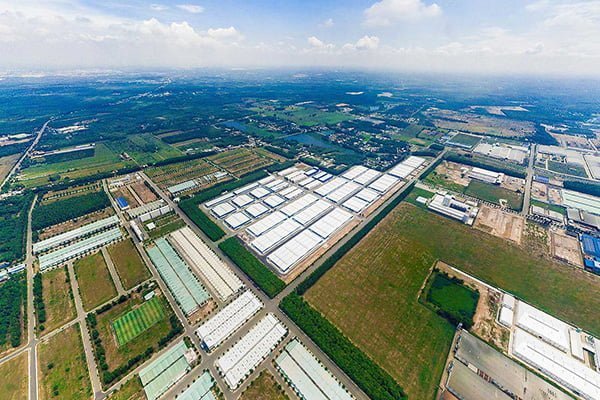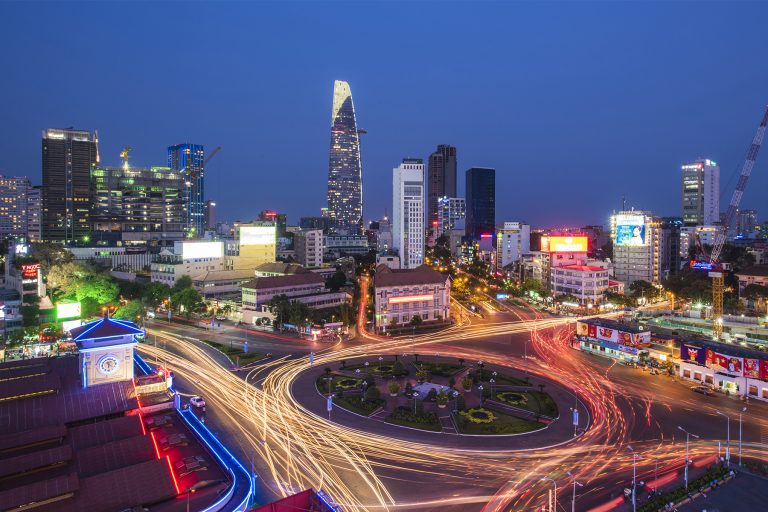Understanding and navigating the procedures to establish a factory in Vietnam is crucial for businesses considering entry into the market. There are two primary methods: leasing land in industrial zones for construction or renting a Ready-Built Factory (RBF). The most significant differences between these approaches are in process, duration and capital investment.
Leasing land for factory construction demands substantial upfront investment and involves a complex process, including securing land plots, navigating legal procedures, and constructing the facility, which can take up to a year and a half.
On the other hand, RBF renting provides ready-to-use facilities with professional management services, reducing operational burdens and providing quicker access to production sites, taking only 6 to 9 months for business setup. Therefore, RBF renting emerges as a preferred option for businesses seeking efficient and cost-effective solutions to expand their operations in Vietnam.
This article will introduce businesses with phases to establish a presence in Vietnam by renting an RBF, including 3 processes: Pre-rental preparation, Rental process, and Post-rental tasks.
Pre-rental preparation
Before the rental process, there are several tasks should be done to ensure the optimization of costs and operations:
- Market research and location selection: This involves thorough exploration and analysis of various industrial zones and regions across the country. Factors such as proximity to key transportation hubs like ports and airports, and the availability of robust infrastructure including roads, railways, and utilities must be carefully evaluated. Additionally, businesses must take into account the regulatory environment, tax incentives, and other government policies that may impact their operations.
- Legal requirements and Due diligence: To ensure compliance with Vietnam’s legal framework, businesses should engage legal counsel. This will help them understand zoning regulations, environmental standards, and any specific industry requirements. Furthermore, conducting due diligence on the selected factory is essential. This involves examining ownership titles, land-use rights, and environmental permits to avoid potential pitfalls.
- Engage with factory developer and local authorities: This initial outreach allows prospective tenants to establish communication channels and gather information about available rental options. Through communicating with factory developers and industrial zone management boards, tenants can understand procedures and documentation requirements for RBF rental.
- Negotiate lease terms: Negotiating lease terms for industrial properties involves aligning rental rates, lease duration, and additional costs with business objectives. This entails assessing market trends, property conditions, and operational needs to determine fair rental rates and suitable lease durations. Careful negotiation of additional expenses such as maintenance fees and utilities help mitigate financial risks and ensures transparency throughout the leasing process.
- Infrastructure and utilities: Evaluating the infrastructure and utilities may entail assessing the availability and reliability of essential amenities such as electricity, water supply, telecommunications, and transportation networks. Tenants must confirm that the chosen location meets their operational requirements and negotiate any necessary improvements or modifications with the developers.
- Workforce Considerations: Collaborating with factory developers and local workforce agencies is helpful for businesses investigating the labour landscape in the local area. Companies can engage with developers to gain insights into labour availability, skill sets, and potential challenges within the local workforce. Additionally, partnering with local workforce agencies provides access to valuable resources, such as job training programs, recruitment assistance, and labour market insights.
Rental process
After careful preparation, these 2 main tasks are required in the rental process:
- Review and signing the Memorandum of Understanding (MOU): Collaborating with legal professionals well-versed in Vietnamese law is indispensable to ensure that all contractual documents adhere to local regulations and standards. These legal experts meticulously scrutinize the MoU, verifying its compliance with Vietnamese legal frameworks and addressing any potential discrepancies or ambiguities. Moreover, they provide valuable insights into the legal landscape, helping to facilitate negotiations.
- Deposit payment: The deposit payment serves as a crucial step to secure the property for lease. Generally, this deposit amounts to approximately one month’s rent and is required to reserve the factory. This financial commitment signifies the tenant’s intent to proceed with the lease agreement and protects the landlord against any potential damages or breaches of the lease terms by the tenant.
Post-rental tasks
The above-mentioned steps set a starting point for businesses operating in Vietnam. In addition several tasks should be taken as follows:
- Establishing a legal entity in Vietnam: Establishing a legal entity typically involves obtaining an Investment Registration Certificate (IRC) and an Enterprise Registration Certificate (ERC) from the relevant authorities. Additionally, depending on the nature of the business activities and industry sector, obtaining other sub-licenses may be necessary to ensure compliance with local regulations. These sub-licenses could include permits related to environmental protection, fire safety, construction, and other specific requirements.
- Signing the lease agreement and factory handover: After the payment of the required deposit, both parties finalize the terms and conditions of the lease agreement. Subsequently, upon agreement on the terms, the factory handover takes place. This involves the landlord formally transferring the right to use the factory to the tenant. Since then, tenants can secure their rental agreement and commence operations in the rented factory space with confidence and clarity.
- Obtaining firefighting drawing approval: Before fitting-out, companies shall submit the firefighting drawing to provincial police for approval, which will take 5 – 10 business days
- Machinery imports and installation: Upon establishing a legal entity in Vietnam, investors can proceed to import machinery and equipment for fitting-out. The Vietnamese government ban the imports of obsolete machinery and items that has exceeded 10 years old into Vietnam. In addition, certain machinery is subject to quality inspection before importing custom clearance.
- Obtaining environmental license: Depending on industry, production scale and environmental factors, businesses must obtain different type of environmental license/ report. Further information can be found at Eligibility criteria for environmental license or environmental impact assessment report (EIAR).
- Obtaining firefighting acceptance: Before commencing operation, companies must obtain the firefighting acceptance from the provincial police to demonstrate the eligibility of the installed system and compliance with the approved design. Information on application dossier and process are available at Guideline for firefighting acceptance application.
By following the outlined phases, businesses can secure appropriate factory spaces, enhance operational efficiency, adhere to pertinent regulations, and leverage Vietnam’s dynamic business landscape. In conclusion, opting for RBF rental in Vietnam is a strategic investment, providing businesses with a pathway to establish a strong presence and seize the vibrant opportunities offered by the country.



